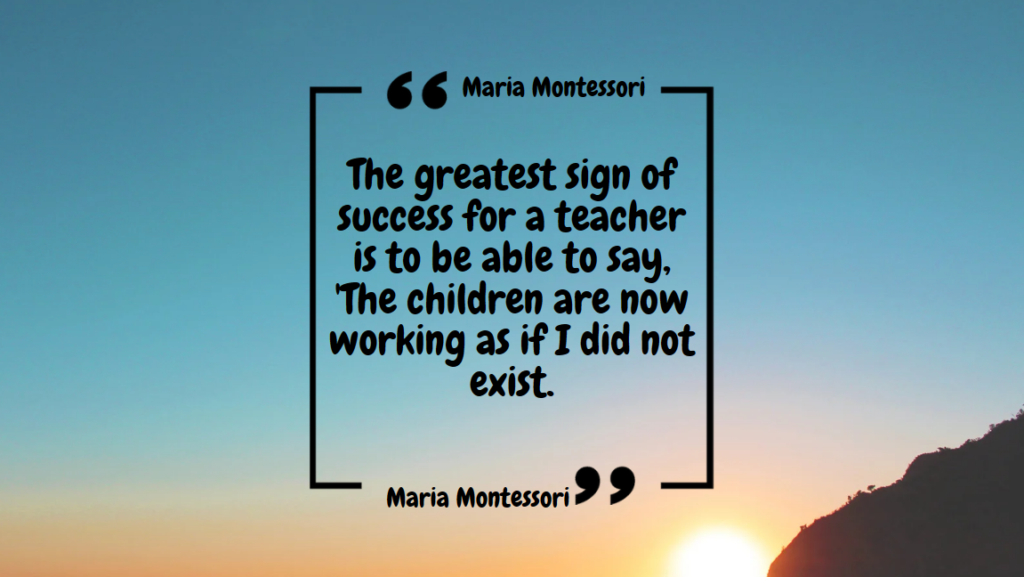Maria Montessori, an Italian physician and educator, pioneered child development, introducing the world to her innovative approach known as the Montessori method. Through her extensive research and experience, Maria Montessori’s quotes’ profound wisdom and insights continue to resonate with and empower parents, offering valuable guidance for nurturing and raising children.
Let’s take a journey through 12 transformative Maria Montessori quotes that have the potential to revolutionize your approach to parenting.
Quote 1: “The greatest sign of success for a teacher is to be able to say, ‘The children are now working as if I did not exist.”

This quote reflects Maria Montessori’s belief in fostering independence and self-motivation in children. It signifies that a teacher’s ultimate achievement is when the children become fully engaged and self-directed in their learning without constant dependence on the teacher’s guidance. It highlights the importance of creating an environment that empowers children to take ownership of their education and develop a sense of autonomy.
Quote 2: “The child is both a hope and a promise for mankind.”
In this quote, Montessori emphasizes the tremendous potential and significance of children in shaping the future of humanity. She views children as a source of hope, embodying positive change and progress possibilities. Montessori’s approach recognizes the unique capabilities of children and the importance of nurturing their development to unlock their full potential.
Quote 3: “The first essential for the child’s development is concentration.”
Montessori believed that concentration is a vital aspect of a child’s development. Through focused and uninterrupted engagement in purposeful activities, children cultivate their ability to concentrate, enhancing their learning, problem-solving skills, and cognitive development. Montessori emphasized the importance of creating an environment conducive to concentration, free from distractions, so children can fully immerse themselves in their pursuits.
Quote 4: “The essence of independence is to be able to do something for oneself.”

This quote underscores the significance of independence in a child’s development. Montessori emphasized the importance of allowing children to take responsibility for their actions and develop the skills and confidence to do things themselves. By promoting independence, children develop a sense of self-reliance, problem-solving capabilities, and self-esteem, setting the foundation for their overall growth and development.
Quote 5: “The child who has felt a strong love for his surroundings and for all living creatures, who has discovered joy and enthusiasm in work, gives us reason to hope that humanity can develop in a new direction.”
In this quote, Montessori emphasizes the importance of cultivating a deep love and respect for the environment and all living things in children. She believed that when children develop a sense of connection and reverence for their surroundings and find joy and satisfaction in purposeful work, they contribute to the evolution of humanity toward a more compassionate and sustainable future.
Quote 6: “Never help a child with a task at which he feels he can succeed.”
This quote highlights Montessori’s belief in fostering independence and allowing children to develop problem-solving skills. Montessori urged adults not to unnecessarily intervene in tasks that a child feels capable of accomplishing independently. By allowing children to face challenges and learn from their own experiences, they develop confidence, resilience, and a sense of accomplishment.
Quote 7: “One test of the correctness of educational procedure is the happiness of the child.”
Montessori emphasized that the happiness and well-being of the child are essential indicators of the effectiveness of educational practices. She believed that a child’s natural curiosity and joy in learning should be nurtured and supported rather than stifled. By creating a joyful and fulfilling learning environment, educational methods can be evaluated based on the happiness and satisfaction experienced by the child.
Quote 8: “The child’s development follows a path of successive stages of independence.”

This quote signifies Montessori’s understanding that a child’s development is a gradual progression toward increasing independence. Each stage of development builds upon the previous one, allowing the child to acquire new skills, knowledge, and abilities. Montessori’s approach focuses on providing appropriate challenges and opportunities for growth at each stage, allowing the child to develop and thrive at their own pace.
Quote 9: “It is necessary for the teacher to guide the child without letting him feel her presence too much so that she may always be ready to supply the desired help but may never be the obstacle between the child and his experience.”
This quote emphasizes the role of the teacher as a guide rather than a constant presence in the child’s learning journey. Montessori believed that the teacher should offer support and assistance when needed but should also allow the child to explore and learn independently. By maintaining a delicate balance, the teacher ensures that the child’s experiences are authentic and uninterrupted, promoting intellectual and emotional growth.
Quote 10: “We discovered that education is not something which the teacher does, but that it is a natural process that develops spontaneously in the human being.”
This quote highlights Montessori’s belief in children’s innate drive to explore, learn, and develop. She recognized that education is not simply a transfer of knowledge from teacher to student but rather a natural process that unfolds within the child. Montessori’s approach focuses on creating an environment that supports and nurtures this inherent drive, allowing children to develop their abilities and skills organically.
Quote 11: “The things he sees are not just remembered; they form a part of his soul.”

Montessori emphasizes the profound impact of experiences and observations on a child’s development. According to her perspective, the child’s experiences shape their inner world and profoundly influence their character, values, and overall development. This quote underscores the importance of providing children with meaningful and enriching experiences that positively contribute to their growth and inner development.
Quote 12: “No social issue is as universal as the oppression of the kid.”
In this quote, Montessori draws attention to the widespread issue of mistreatment and neglect of children. She believed that the mistreatment of children is a deeply rooted social problem that needs to be addressed universally. Montessori’s work aimed to empower children, providing them with respect, opportunities for growth, and a nurturing environment, to combat this widespread oppression.
The Value of Montessori’s Quotes in Nurturing and Guiding Your Children’s Development
Montessori’s quotes are highly relevant for parents who want to raise and nurture their children. Montessori highlights the importance of fostering independence, concentration, and a love for learning, which are essential qualities for children’s growth and development.
Through her quotes, parents are encouraged to create an environment that supports their children’s autonomy, problem-solving skills, and appreciation for the world around them. By incorporating these principles into their parenting, parents can empower their children to become self-motivated learners, develop a strong sense of self, and contribute positively to society.
The Bottom Line
Adopting Montessori principles in parenting can bring about a significant transformation in the way we raise our children. This will help to promote their self-esteem and independence and create a bright future for them. We can achieve this by creating child-friendly environments, offering age-appropriate activities, and allowing them to learn from their experiences.
If you share this passion for Montessori education and want your child to benefit from it, Montessori Academy is the perfect school for you. Our experienced educators, child-friendly spaces, and curriculum are designed to encourage critical thinking, creativity, and independence. We provide a nurturing and stimulating environment where your child can learn at their own pace. Contact us today to learn more about our admissions process and how your child.

